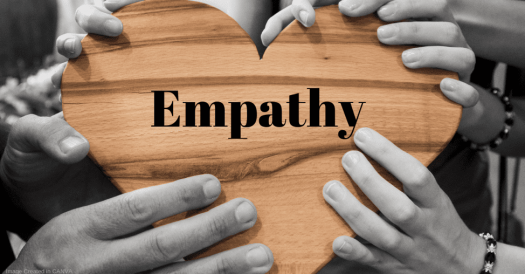Written by Alicia Cassels, MA
When you show deep empathy toward others, their defensive energy goes down, and positive energy replaces it. That’s when you can get more creative in solving problems.” -Stephen Covey
As a former clinician, I have experienced the power that empathy carries in the clinical care setting. I have observed the ways in which empathy can serve as a catalyst for establishing the trust required to partner with families in addressing complex challenges. I have marveled at the way empathy serves as a bridge to human connection in the care setting, diffusing tension, and opening doors to partnership in the healing process. As social beings, we tend to instinctively recognize and respond to the qualities of empathy. More than just a “soft skill”, the ability to convey empathy can be one of the most important tools in the practitioner’s toolbox.
What Does Research Tell Us About Empathy?
Researchers studying the power of empathy at the University of California, Berkeley, describe empathy as,
The ability to sense other people’s emotions, coupled with the ability to imagine what someone else might be thinking or feeling…”
Studies indicate that when care providers display empathy, patients are more open to hearing provider recommendations, more satisfied with their care, and in some cases, experience better health outcomes (Boissy, et al.; Tayal, et al., 2018). It is not difficult to understand why individuals and families who are scared, vulnerable, and navigating some of the most difficult circumstances they will ever face respond more positively to providers who display empathy.
What is, in fact, surprising is that, while social work and behavioral health training programs include core empathy components, formal empathy training tends to be completely absent in medical programs. More disconcertingly, is the research which indicates that empathy declines, in many cases, as doctors progress through their medical training (Hojat, et al., 2009; Nunes, Williams & Stevenson, 2011; Reiss, 2017; Williams, & Stevenson, 2011).
Here’s the Good News.
Empathy skills can be learned and improved. If you are interested in assessing or improving your skills, check out the American Medical Association and the Greater Good Science Center resources below.
Take the Greater Good Science Center Quiz to assess your empathy skills.
Learn How to Listen with Empathy.
The American Medical Association offers a free training module for care providers interested in learning skills for listening with empathy.
References:
- Boissy, A., Windover, A. K., Bokar, D., Karafa, M., Neuendorf, K., Frankel, R. M., Rothberg, M. B. (2016). Communication Skills Training for Physicians Improves Patient Satisfaction. Journal of general internal medicine, 31(7), 755–761. doi:10.1007/s11606-016-3597-2
- Hojat M, Vergare MJ, Maxwell K, Brainard G, Herrine SK, Isenberg GA, et al. The devil is in the third year: a longitudinal study of empathy erosion in medical school. Acad Med. 2009; 84:1182–91. doi: 10.1097/ACM.0b013e3181b17e55.
- Nunes P, Williams S, Stevenson K. A study of empathy decline in students from five health disciplines during their first year of training. Int J Med Educ. 2011; 2:12–7.
- Riess H. (2017). The Science of Empathy. Journal of patient experience, 4(2), 74–77. doi:10.1177/2374373517699267
- Tayal, Suzanne C, et al. Listening with Empathy, Electronic Health Records. AMA STEPS Forward. AMA Ed Hub, 2018, edhub.ama-assn.org/steps-forward/module/2702561.




![Blog Post Image: Pexels [Silhouette Photo of Jumping Children, photo by Margaret Weir, Sept. 22, 2017, CC0]](https://oneop.org/wp-content/uploads/2024/04/pexels-margaret-weir-620530-600x403.jpg)










